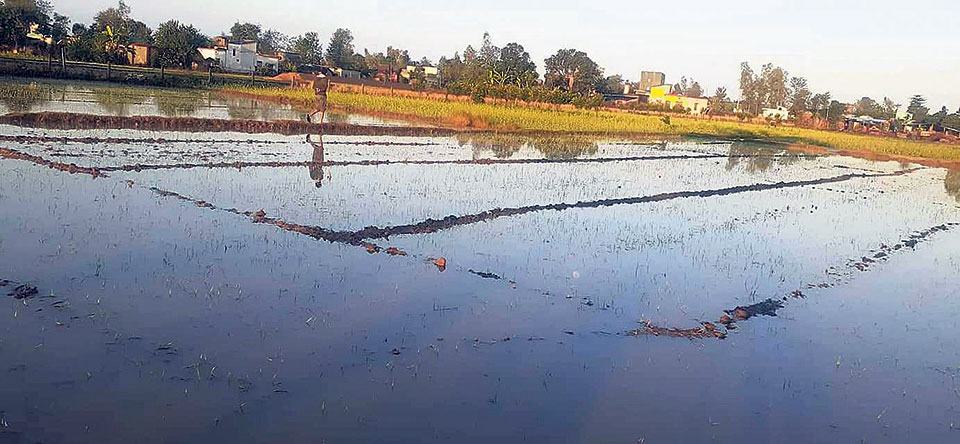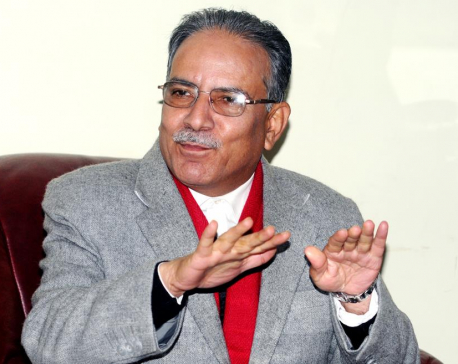
OR
Potato farmers to incur losses of Rs 1 billion due to winter rains
Published On: January 18, 2020 11:11 AM NPT By: Kamal Khatri

BANKE, Jan 18: Potato farmers in Banke and Bardiya districts are facing losses of Rs 1 billion due to excessive winter rain. Potato production in these districts is likely to decline by 50% this season. The excessive winter rain has continued even in January which will furthermore affect the production of vegetables and winter crops in these districts.
According to Kripa Ram Maurya, a farmer in Banke, his three metric tons of potatoes have perished due to spells of heavy rain. Farmers of Hirminiya are facing 50% loss on potato farmed in 500 hectares of land. The financial loss from the damage is likely to hit Rs 200 million.
“Every year, we made reasonable profit from potato farming but this year has been a different story. Our fields are covered with water and the potatoes we have managed to save are getting spoiled,” said Maurya.
According to Sagar Dhakal, Chief of Nepalgunj Agriculture Information Centre, Banke and Bardiya districts produced 88,310 metric tons of potatoes. This year, the production is expected to decline by 50%. The farmers of Banke and Bardiya districts will face losses of Rs 1.23 billion this season.
In Bardiya, potato farming is done in 4,250 hectares of land whereas potato farming is done in 2,875 hectares of land in Banke district. According to Agriculture Knowledge Centre, split red lentil is cultivated in 11,600 hectares of land, gram in 1,550 hectares of land, and winter crops in 4,250 hectares of land. The excessive winter rain in November had affected 15% of vegetable farming. The continuation of winter rain till January has affected 50% of vegetable production and winter crops.
According to farmers of Khajura area of Banke, potato production has decreased by 70% to 80%. “Excessive winter rain has affected vegetable farming, winter crops and potatoes,” said Lal Bahadur Khatri, local of Khajura Rural Municipality.
According to Dhakal, farmers would be better off if they carried out farming of winter crops at high level of land to avoid such natural mishaps. “It is suitable to plant winter crops where there is no water logging and flooded water can be released easily. Use of greenhouses can be adopted for producing vegetables. Potato farming can also be started a few months earlier to avoid winter rain,” said Dhakal.
You May Like This

Human-wildlife conflicts claim 29 lives in Banke, Bardiya in the past five years
RANJHA, June 25: Human-wildlife conflict has continued unabated in Banke and Bardiya districts, resulting in 29 human casualties and several... Read More...

No possibility of merging Banke, Bardiya in Karnali Province: NCP Chair Dahal
SURKHET, Feb 19: Chairperson of the Nepal Communist Party (NCP), Pushpa Kamal Dahal has said that no discussion was held... Read More...

Atawari, festival symbolising family bond begins
DHANGADHI, Sept 16: The 'Atawari' festival which is celebrated by the Chaudhary-Dagaura community of the western Terai in Nepal has... Read More...






Just In
- Challenges Confronting the New Coalition
- NRB introduces cautiously flexible measures to address ongoing slowdown in various economic sectors
- Forced Covid-19 cremations: is it too late for redemption?
- NRB to provide collateral-free loans to foreign employment seekers
- NEB to publish Grade 12 results next week
- Body handover begins; Relatives remain dissatisfied with insurance, compensation amount
- NC defers its plan to join Koshi govt
- NRB to review microfinance loan interest rate











Leave A Comment